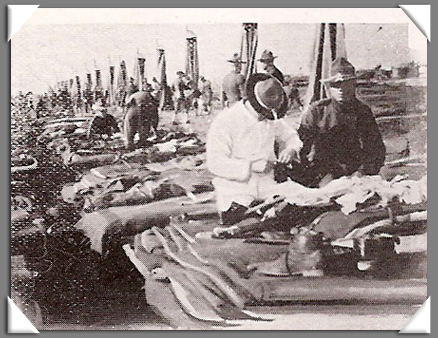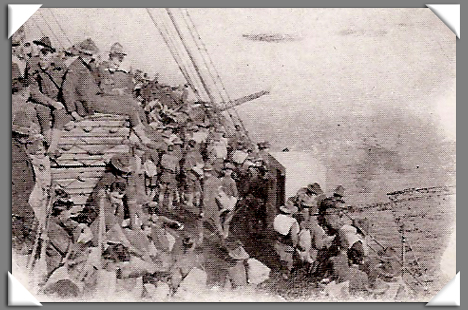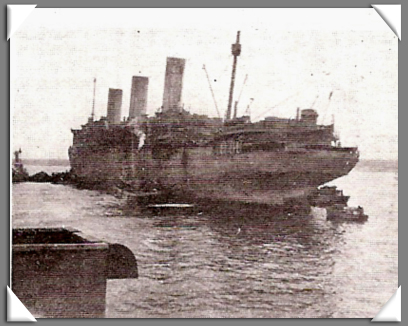|
On April 6 when America declared war upon Germany, the
officers of the National Guard of Iowa at once began the work
of getting their units ready for the part they would be called
upon to play. Enlistments were rapid and before the time
came that the guard was formally called into service on July
15, every company had its full quota ;of men and were besieged
by eager applicants for the privilege of becoming a member of
one of the three regiments of infantry that composed the
First, Second and Third Iowa Guard Regiments.
When the guard was called, every company was full of
eager, adventure-loving young men, who were anxious for but
one thing; the privilege of crossing the waters and getting a
chance to fight the enemy who had so horribly mutilated the
Belgian nation and had outraged and trampled under foot the
sacred rights of all humanity.
There was a great deal of rivalry between the three
regiments as to which was the better fitted and equipped and
would be the first overseas. Day by day in the different
towns in which the companies were stationed and at the camp at
the fair
grounds, the companies were drilling hard to prepare
themselves for the days that lay ahead.
In the latter part of July our companies were all
assembled at the fair grounds and went into camp under the old
amphitheatre and in Machinery Hall, and on August 5, they were
examined by federal officers and formally drafted by a
proclamation of the President into the federal service.
Vaccination for small pox, inoculation for typhoid and
para-typhoid in the hot days of August was one of the first of
our many disagreeable experiences in the Army.
About the middle of August, Colonel Bennett, Major
Conkling, Major Brewer and Major Fairchild came into camp with
smiles clear across their faces. They were bubbling over
with gladness and enthusiasm. We tried all afternoon to
find out what made them so joyous, but not a word would they
say until the following morning when the announcement was made
that the old Third Iowa Infantry had been chosen as one of the
four regiments of infantry that was to make up the
Forty-second or Rainbow Division, which was then being formed
and which was destined to sail immediately for overseas
service.
|
When the news was announced to the regiment, a happier
group or a prouder lot of men would have been |
|
hard to have
found anywhere. We were to be known no
longer as the Third Iowa Infantry but as the One Hundred
Sixty-eighth Infantry. The regiment was to be
enlarged to three thousand seven hundred and five men,
which would make it larger than a brigade had formerly
been.
Further joy was given that day when the announcement was
made that the men to bring us to our new strength were
to be drawn from the other two guard units, the First
and Second, seventy-six men being drawn from each
company of each of these splendid organizations. The
boys of the First and Second, as well as the Third had
made a reputation for themselves on the border and we
were proud indeed to have them
with us to enter into the formation of the 168th Infantry. |
 |
A few days later these fellows escorted by their band
came swinging up through the gates of the fair grounds,
playing their regimental march and marching proudly. Our
band played a welcoming piece and with deafening cheers they
were received and became a part of the Rainbow Division.
This brought the strength of each individual company to
two hundred and fifty men, and our battalions to one thousand
men. A splendid lot of young fellows there were, as in
the morning at reveille or in the evening at retreat, they
lined up for the military ceremony. Earnest work was
done in the few days they remained at the fair grounds before
we were to commence on that long journey to France.
On September 9 with thousands of our friends gathered
about us, our first companies with the colonel's staff loaded
on the train at the fair grounds at 5 o'clock and started
eastward, where most of the rest of the division were already
assembled in Camp Mills. With something gripping our
throats, which we could not swallow, struggling to hold back
the teardrops from our eyes, we stood upon the back of the
train and watched the crowd of folks who came to see us off,
became a blur and then indistinct in the distance. Our
journey had begun.
Four days later we landed at Camp Mills, where we
stayed until October 18, when we were loaded on the President
Grant and with fifty-five hundred men on board, just as the
sun was setting on the New York skyline. We slipped out
of the harbor at 11 o'clock that night. For five days we
journeyed with the rest of the convoy; then the boilers of the
boat gave out and we were forced to return. We went back
to Camp Mills and on November 14 again started across, this
time on the S. S. Celtic, the Baltic and the Aurania.
|
Seventeen days later after being chased by a submarine
into Belfast Harbor, we landed at Liverpool, and were
loaded on the little trains and moved to Winchester,
England. Here we spent seven days in camp, then
moved down to the harbor at South Hampton and slipped
across the channel during the night, the search lights
across the English shore illuminating the sky as they
searched for those who almost nightly came to bomb
London. |
 |
At 4 o'clock the next morning we
landed at LeHavre,
France, where we stayed for thirty-six hours. Then began
our journey for two days and three nights in French cars, when
we came to the Haute Marne country near Chaumont. We
were assigned to the little village of Rimaucourt, where we
stayed until January 27, our Second Battalion under Major
Stanley being assigned to duty with the school of Langres.
In the cold, heatless attics or in the stoveless
barracks our boys suffered much from the cold, wading in
the mud or snow out in the wet fields to drill,
coming in with wet feet and no place to dry them. A
great number sickened and died. An epidemic of
scarlet fever, spinal meningitis and measles broke out
among our troops and we |
went into quarantine for
many days.
In the latter part of January we moved to Ormancey from
which place we started toward the line early in February.
After a few days journey we reached Gerberviller and marched
from there to Baccarat, twenty-six kilometers, where we stayed
for two days. We were reviewed by General Segonne.
From there we moved to Pexonne, where we established our
regimental headquarters. On the morning of February 23,
we were ready for our first hitch in the trenches.
Looking back over those days when we moved from Des
Moines to France, going through all the hardships and
exposures which the regiment endured, I am surprised that
there were not more of these
|
young boys,
who made up our regiment, who did not sicken and die
before we arrived.
The history and pictures of the men who died before
they reached the battle line are herein described.
They are as truly our heroes as the men who fought and
distinguished themselves at the front. They enlisted for
the same purpose and tried as much as any of us to enter
into the conflict and to play their part in the battle but fate had
willed it otherwise, theirs was not to be a glorious death on
the battle field, but to lie in the hospitals and succumb to
the power of disease. From the first boy who died before
we left Des Moines to the last one who was killed on our way
to the front, we honor their memory as much as we do any of
the others, whose heroic deaths fill the pages of this book. |
 |
|